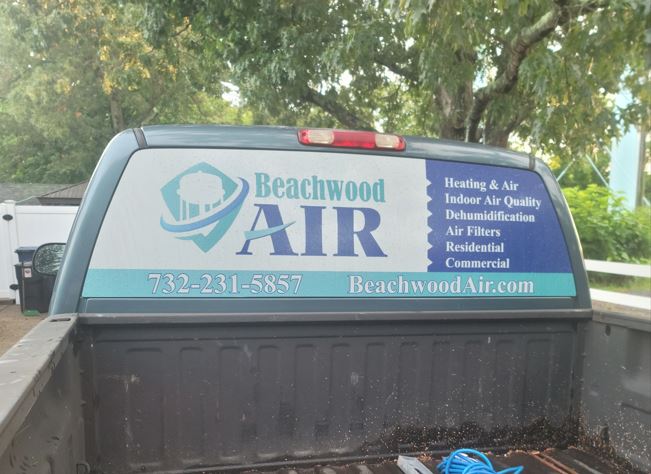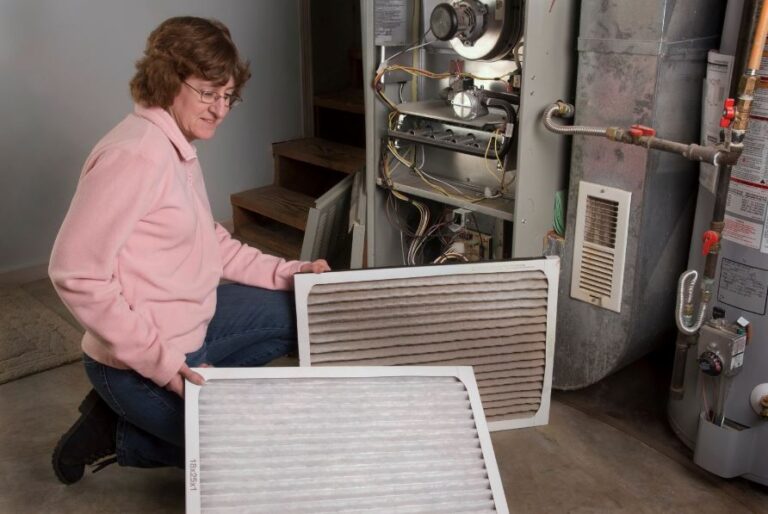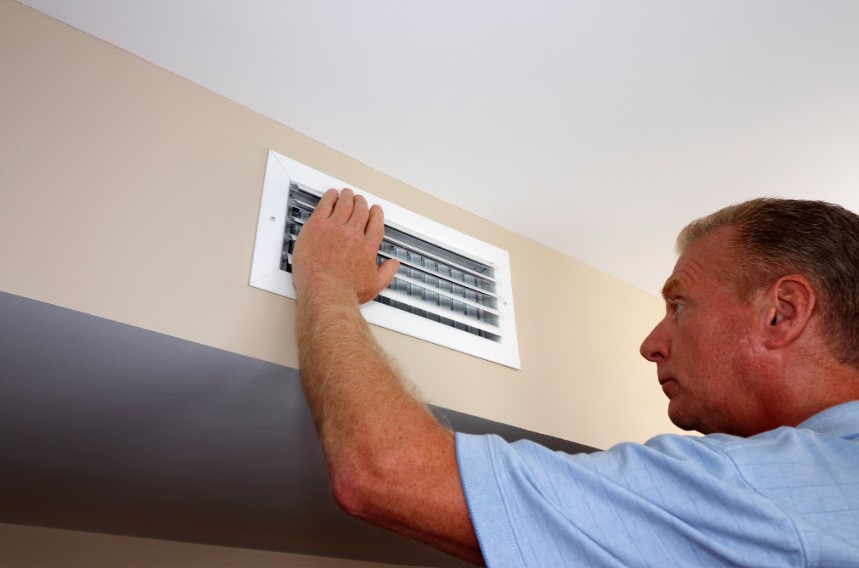
Have you wondered if closing air vents in unused rooms saves on energy costs or your HVAC system’s improves system efficiency?
Closing air vents in your home does more harm than good, disrupting the intended airflow balance of your HVAC system and potentially leading to increased energy costs and system strain.
Is Energy Conserved by Closing Air Vents?
Shutting air vents does not conserve energy. This common misconception leads homeowners to believe that by closing vents in unused rooms, they can reduce their energy consumption and lower their energy bill. This isn’t how HVAC systems actually operate.
Understanding HVAC Efficiency
HVAC systems are designed to distribute air evenly throughout your home, with calculations made for the entire space regardless of whether certain rooms are used less frequently. The system’s efficiency is predicated on this balance of airflow. When vents are closed, this balance is disrupted, leading to increased air pressure in the air ducts.
Increased pressure forces the heating and cooling system to work harder, not more efficiently. Additionally, keeping the furnace fan on during the summer helps maintain proper airflow and prevents warm air accumulation in upper floors. Essentially, the HVAC unit expends more energy in attempting to maintain the set temperature across the home, as the closed vents obstruct the system’s designed airflow path. This can result in higher, not lower, energy consumption.
The Impact of Closed Vents
When air vents are closed in an attempt to redirect airflow or save energy, it disrupts the system’s balance. This can lead to several unintended consequences:
- Increased Pressure: Closing vents increases pressure in the ductwork. Modern HVAC systems are equipped with pressure relief pathways, but overloading these can strain the blower motor, reducing efficiency and potentially leading to premature failure.
- Reduced Efficiency: Instead of saving energy, closing vents can make the HVAC system work harder. The cooling and heating system is designed to distribute air based on open pathways. When these pathways are blocked, it struggles to achieve the set temperatures, using more energy in the process.
- Uneven Heating and Cooling: It’s a misconception that closing vents redirects airflow effectively. Instead of guiding air to desired areas, it simply creates pressure imbalances, leading to hot and cold spots throughout the home. This can hinder the flow of cool air during the summer months, making it harder to maintain comfortable indoor temperatures.
- Risks to Indoor Air Quality: Increased pressure can also lead to duct leakage, where dust and other particles may enter the system and reduce indoor air quality. Additionally, there is a potential for an air vent leak, which can further compromise HVAC efficiency and lead to higher utility costs.
Best Practices for Efficient Air Distribution
For homeowners looking to achieve better energy efficiency and comfort, consider these alternatives:
- Regular Maintenance: Ensure your HVAC system receives regular maintenance. This includes cleaning filters, servicing the motor, and checking for duct leaks.
- Zoning Systems: Consider investing in a zoning system. These allow you to control the temperature in different areas of your home independently without disrupting the overall system balance. Closing too many vents, however, can adversely affect the HVAC system’s functionality and lead to increased utility bills.
- Consulting Professionals: Before making significant changes to your HVAC system’s operation, consult with a specialist. At All Air Systems, we can provide tailored advice to optimize your system’s performance without compromising on efficiency or comfort.
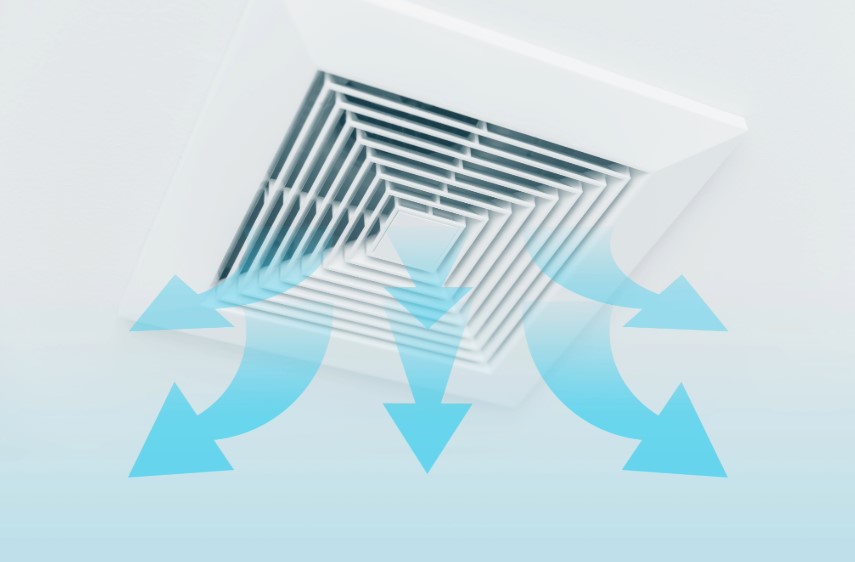
Closing air vents seems like a straightforward way to control comfort and save on energy bills. However, understanding the complexities of how HVAC systems are designed and operate reveals that this method may not be as effective as it seems. Always seek professional guidance to ensure that your efforts to improve energy efficiency do not inadvertently harm your system.
The Effectiveness of Closing Vents in Spare Rooms on Air Flow
Closing vents in spare rooms to save on energy costs and improve airflow efficiency in occupied areas of the home is a strategy that many homeowners consider. However, understanding the actual impact of this action on your HVAC system’s airflow and air conditioner is crucial.
While closing vents in spare rooms might seem like a straightforward way to improve efficiency and reduce energy costs, the reality is far from simple. Such actions can disrupt your HVAC system’s intended operation, potentially leading to increased energy use, reduced comfort, and even system damage. Additionally, closing vents can cause pressure buildup in air ducts, leading to potential leaks and reduced airflow throughout the home. To truly enhance the performance of your HVAC system, focus on proper maintenance, smart technology, and expert guidance.
The Cons of Partially Closing Air Vents In Your Home
Partially closing air vents in your home, with the intention of redirecting airflow or saving on energy costs, is a practice that requires a closer examination. Despite the perceived benefits, this approach can introduce several disadvantages to your HVAC system’s operation and overall home comfort.
One significant issue is the accumulation of hot air, which can affect home comfort and HVAC efficiency, especially during the summer months. Additionally, the influx of humid air from outside can elevate indoor moisture levels, particularly in basements, leading to mold growth, condensation on surfaces, and attracting pests.
Impaired System Balance
Your HVAC system is designed for balance, distributing air throughout your home based on its total calculated need. When you partially close vents, you disrupt this balance, creating pressure imbalances within the ductwork. This disruption forces your system to work harder than necessary, potentially leading to increased wear and tear on its components.
Reduced Energy Efficiency
Contrary to the goal of saving energy, partially closing vents can actually lead to higher energy consumption. The system’s blower must work harder to distribute air through the reduced openings of the partially closed vents, consuming more energy in the process. This inefficiency can negate any anticipated savings on your energy bills.
Potential for Increased Repair Costs
The added strain on your HVAC system from attempting to push air through restricted pathways can accelerate the wear on critical components, such as the blower motor and compressor. Over time, this can increase the likelihood of repairs or even necessitate premature system replacement, leading to unexpected expenses.
Risk of Uneven Heating and Cooling
By disrupting the intended airflow pattern within your home, partial air vent closure can create uneven temperatures, resulting in uncomfortable hot or cold spots. This not only detracts from the comfort of your living environment but can also prompt unnecessary adjustments to your thermostat, further impacting energy consumption.
Why Not To Close Basement Air Vents
Closing basement air vents might appear to be a practical solution for homeowners looking to improve energy efficiency or redirect airflow to more frequently used areas of the house. However, this seemingly simple act can have complex consequences for your HVAC system and home comfort.
Closing basement vents in the summer can lead to potential energy savings, but it also carries risks. Prolonged closure can disrupt HVAC efficiency and overall cooling in the home. It’s important to rotate closed vents and avoid common misconceptions about this practice.
Here’s why closing these vents often does more harm than good:
- Increased Humidity and Mold Growth: Basements are naturally prone to higher humidity levels due to their underground location. When air vents are closed, air circulation decreases, allowing humidity to build up. This creates an ideal environment for mold and mildew growth, potentially leading to health issues and damage to your home.
- Impacts on System Efficiency: Like other areas of your home, the basement is considered in the balanced air distribution your HVAC system is designed to achieve. Closing vents in the basement can disrupt this balance, leading to the already-discussed issues of increased system strain and decreased energy efficiency.
- Temperature Imbalances: Your HVAC system works to maintain a constant temperature throughout your home. Closing basement vents can lead to temperature imbalances, making upper floors excessively warm during summer or too cold in winter as the system struggles to distribute air evenly.
- Risk of Frozen Pipes: In colder climates, heating provided through basement vents is crucial to preventing pipes from freezing. By closing these vents, you reduce this risk protection, potentially leading to burst pipes and significant water damage.
In essence, the basement plays a critical role in your home’s overall air quality and temperature regulation. Instead of closing vents, consider other strategies for improving energy efficiency, such as installing insulated doors and windows in the basement, using a dehumidifier to control moisture levels, or consulting with a professional about zoning options for your HVAC system. These steps can enhance comfort and efficiency without the negative side effects of closing basement air vents.
Solving Temperature Imbalances with Zoning
One of the most common issues homeowners face is uneven temperatures throughout their living spaces. Certain rooms or areas may feel too hot or too cold, leading to discomfort and constant thermostat adjustments. While closing air vents may seem like a quick fix, this approach can actually cause more harm than good.
Closing air vents creates excessive pressure within the ductwork, forcing your HVAC system to work harder and potentially leading to premature wear and tear. Additionally, it disrupts the carefully designed airflow balance, resulting in inefficient heating or cooling and increased energy consumption.
A zoning system offers a superior solution to this problem by intelligently controlling the airflow throughout your home. Here’s how it works:
- Your home is divided into multiple zones, each with its own thermostat and dampers within the ductwork.
- The dampers open or close to regulate the airflow to each zone based on the temperature settings of the respective thermostats.
- This allows you to set different temperatures for different areas of your home, ensuring consistent comfort levels tailored to your preferences and usage patterns.
With a zoning system, you can address specific temperature challenges without compromising the overall efficiency of your HVAC system. For example, you can increase the cooling in a sun-exposed room during the afternoon while maintaining a comfortable temperature in the rest of the house.
By eliminating the need for manual vent adjustments, zoning systems maintain proper airflow and pressure within the ductwork, preventing potential damage and ensuring optimal performance from your HVAC equipment.
Not only does zoning provide superior temperature control, but it also contributes to significant energy savings. You’re only heating or cooling the occupied areas of your home, reducing unnecessary energy consumption and lowering your utility bills.
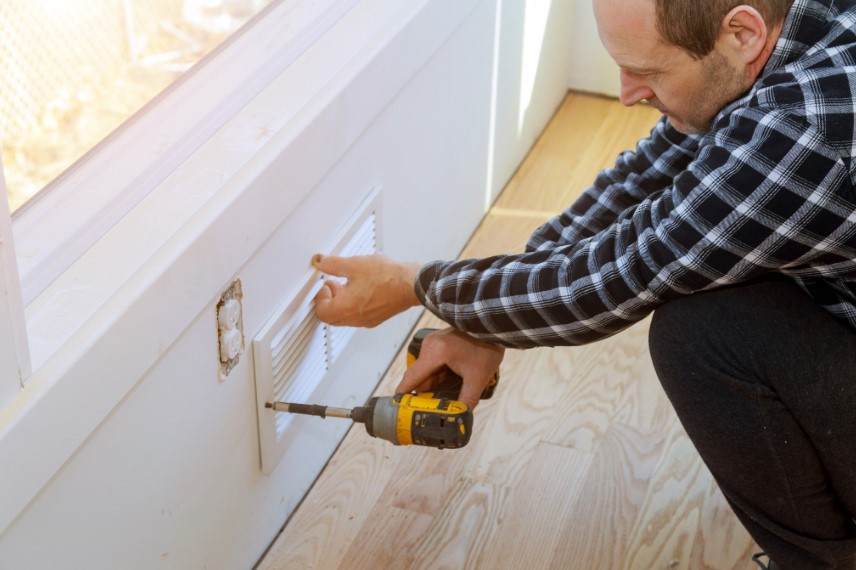
Save Energy the Right Way With All Air Systems
If you’ve been struggling with temperature imbalances or inefficient heating and cooling, a professionally installed zoning system from Beachwood Air could be the solution you’ve been looking for. Our experts will assess your home’s unique needs and design a customized zoning system that delivers unparalleled comfort and efficiency.
Seeking to reduce your home’s energy consumption and lower your utility bills is a commendable goal. With All Air Systems, you can achieve these objectives effectively, without compromising the integrity of your HVAC system or the comfort of your home. Understanding the proper methods to save energy is, and All Air Systems is here to guide you through the maze of options with expert advice and innovative solutions.
Call (732) 231-5857 or Contact Us for a New Jersey HVAC Zoning Assessment
Frequently Asked Questions?
Q: What is a heat exchanger?
A: A heat exchanger is a device designed to efficiently transfer heat from one medium to another, at different temperatures, without them mixing together. It plays a crucial role in various applications across industries, including heating, ventilation, air conditioning systems (HVAC), refrigeration, power generation, and chemical processing.
The basic principle behind a heat exchanger involves two fluids with different temperatures flowing through the device; one fluid releases heat while the other absorbs it, resulting in temperature changes in both fluids. The process of heat exchange can occur through a solid separator, which prevents mixing but allows heat transfer, or through direct contact between the fluids.
Heat exchangers come in various designs and configurations, tailored to specific applications and efficiency requirements. Some common types include:
- Shell and Tube Heat Exchangers: These consist of a series of tubes, one set carrying the hot fluid and the other the cold fluid, encased within a shell. The heat transfer occurs as one fluid flows inside the tubes and the other around them, within the shell.
- Plate Heat Exchangers: Comprising multiple thin, corrugated plates stacked together, allowing hot and cold fluids to pass through alternating spaces between the plates. The large surface area of the plates facilitates efficient heat transfer.
- Air Cooled Heat Exchangers: Utilize ambient cold air to cool a hot fluid by passing it through finned tubes, which significantly increases the surface area for heat exchange. Commonly used in situations where water is scarce.
The effectiveness of a heat exchanger is determined by several factors, including the surface area available for heat transfer, the temperature difference between the mediums, and the nature of the fluids involved (e.g., viscosity, thermal conductivity). Proper design and maintenance are essential to ensure optimal performance and longevity of the device.
Q: Will partially closing ac vents in your home save energy?
A: Partially closing AC vents in your home with the intention of saving energy might seem logical, but it can actually lead to increased energy usage and reduce system efficiency. When vents are closed, air pressure within the ducts rises, forcing your HVAC system to work harder. This not only strains the system, potentially leading to costly repairs or a shorter lifespan, but it can also disrupt the intended airflow balance, making some rooms less comfortable. Instead of achieving energy savings, this practice can inadvertently increase your energy bills and lead to uneven cooling or heating.


